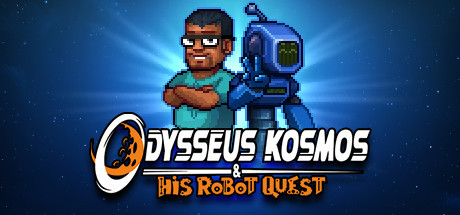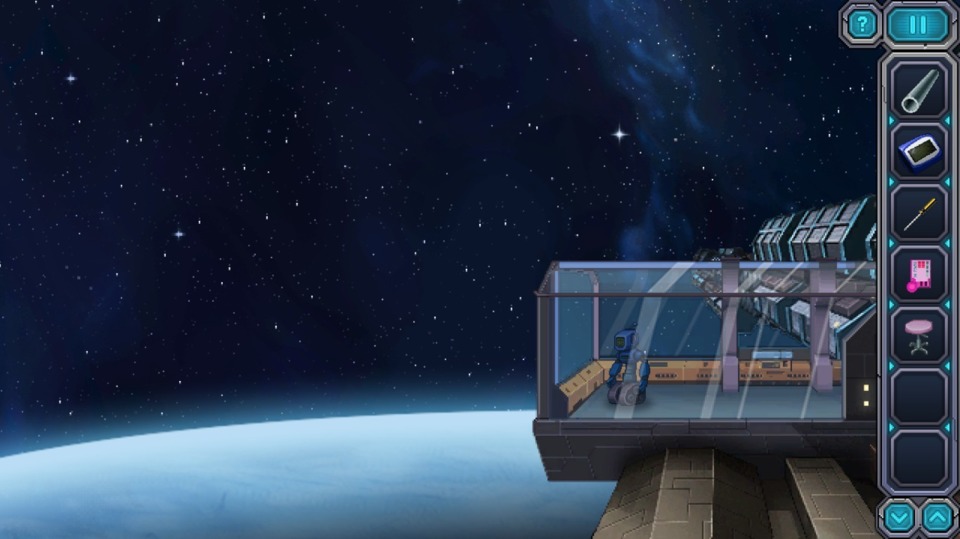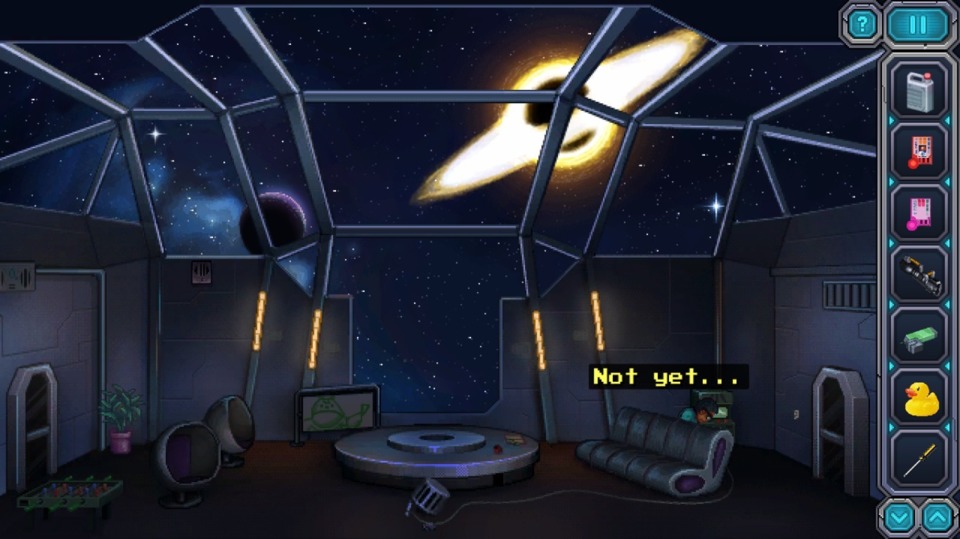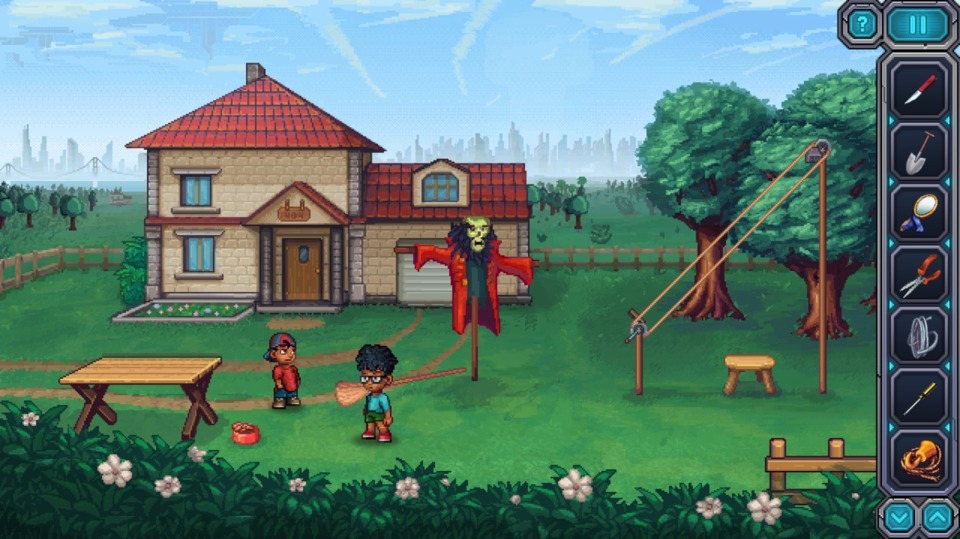Go! Go! GOTY! 2019: Game Four: Odysseus Kosmos and His Robot Quest
By Mento 0 Comments

- Game: Pavel Kostin's Odysseus Kosmos and His Robot Quest
- Release Month: April (Episode 5).
- Quick Look: N/A.
- Started: 07/12.
- Completed: 08/12.
For the sake of this series I was checking up on the status of Kentucky Route Zero - still no news about that fifth act, alas, despite a tentative and apparently way too optimistic 2019 release date - and instead discovered that another episodic adventure game I'd forgotten about had finally completed its five-episode arc earlier this year. Odysseus Kosmos and His Robot Quest, a sci-fi game with mysteries like Outer Wilds but unlike Outer Wilds did not crash and delete all my saves, is a classic 2D pixel-based graphic adventure game with some tricky puzzles and quality writing with a story that riffs just a little bit on the movies Solaris and Interstellar. (Here is my original rundown of its first two episodes, and this review will look at the series as a whole.)
The titular Odysseus Kosmos is a crewmember of the USS San Francisco and the ship's engineer, which is why he was left behind when the rest of the crew took a shuttle to a nearby exoplanet orbiting a supermassive black hole. If you've seen Interstellar, or just know anything about black holes, the time dilation of this planet compared to the one currently experienced by those on the ship - orbiting a slightly more distant planet for reasons not elaborated - means that far more time is passing for Odysseus than for the intrepid away team. It's been seven years since the shuttle left by the time the game starts, and Odysseus would be beside himself with concern for his fellow crew if he wasn't so bored - as the sole human on board, he's taken to playing mind games with his robotic companion Barton Quest and overeating - and when the game begins he's patching up the ship with whatever tools are handy, in true resourceful adventure game hero style. Then the maybe-not-all-in-his-head hallucinations of a young woman begin...

I've played a number of adventure games where you're the sole survivor of a space voyage (for all you know, at least) and must first spend time contending with the Apollo 13-esque life-or-death mechanical issues that abound in space travel before settling down with the deeper and less urgent mysteries that arise when trapped in a bucket halfway across the galaxy and are slowly going stir crazy. That was the case with Subnautica - a game that spent far more time forcing the player to attend to their basic survival needs than allowing you to go off and explore the fascinating xenoarcheology and alien pathogen plot points - as well as the likes of Mission Critical, going even further back. I'm regretful that I originally had to bounce from Odysseus Kosmos just as the aforementioned Solaris business started to kick off, as the first two chapters were all that were available at the time. Since it's been a spell, I started over, so here's a recap of the first episode:
Episode 1 of any serial adventure game is required to do a lot of the expositional heavy lifting, though there's thankfully little you need to understand going in and there's enough optional lore in the ubiquitous computer terminals to answer any questions about the set-up. The bulk of Episode 1's tasks resume after Odysseus realizes the extent of the ship's disrepair, due to a malfunction in the computer that detects malfunctions. Through this process we learn more about the two main characters, about the layout of the ship and the purpose of its chambers, and about Odysseus's strengths as a character and his sanity-stretching predicament. It's also made evident that, although it's usually binary-choice-dependent story-heavy adventure games that become five-part series such was the case for The Walking Dead or Life is Strange, Odysseus Kosmos's aspirations are closer to that of Wadjet Eye's: to revisit a period of classic 2D point-and-click adventures where inventory puzzles and experimentation are the order of the day. Not to say there won't be more story beats later, but when your protagonist is a sardonic space engineer with a MacGyver knack for improvisation, your game should ideally play to that virtue.

Later episodes start taking some interesting narrative detours. For instance, the second episode begins with a protracted flashback to Odysseus's childhood, where he plays pirates and hide and seek with his younger brother Sam, but something's off: a model of the San Francisco is in the boys' hideout, despite the fact it won't be built until Odysseus is in his adult years; there are trees and greenery in the flashback, even though global warming - which has become so severe it's simply referred to as "The Warming" - has driven the less heat-resistant flora and fauna to extinction; and finally, the same odd woman who appeared to Odysseus at the end of episode 1 appears here also. This is where the game starts flexing the aforementioned Solaris muscles, and it becomes a recurring pattern throughout the later episodes, in addition to goals involving fixing whatever is causing the engineering crisis of the moment. The third episode switches control to Barton throughout, who doesn't necessarily play differently than Odysseus (besides being able to go outside) but offers a fresh perspective and also starts a second story thread about certain truths about the mission that he is privy to and Odysseus is somehow not. Episode 3 also introduces the other crew members, sorta, by allowing Barton to access their rooms for plot-vital items. Each has a diary too, though they're fairly cryptic given what we think we know about the ship, the crew, and the mission. Beyond that, we're in the Shyamalan Twist Zone and I daren't say more.
A curious but decidedly beneficial facet of this serial format is that each episode is required to use the same setting - there's no getting off the San Francisco, except in flashbacks - but the game prioritizes different areas for each episode, eliminating those that have no purpose for the immediate scenario and occasionally introducing new rooms on the ship we've had no reason to visit before. That might mean losing access to the laboratory area for the third and fifth episodes, or never visiting the crew quarters and the hallway that contains them before the third, since Odysseus only has access to his own - instead, the door that leads off to the crew quarters had always taken the player directly to Odysseus's cabin, since there's no point adding anywhere else. Thus, after the full run you can mentally map the full layout of the ship, but you only ever see a truncated version in any single episode. Recurring items, likewise, will randomly appear across the ship as they get misplaced by Odysseus or Barton, and finding them again is like a little boost of familiarity even if their role ends up being different. It's a smart way to be economical with the game's limited art assets as well as being convenient to the player by removing surplus elements like inconsequential rooms that will only prove to be red herrings or dead air if left in, dragging out the puzzles longer than they need to be.

The game also has a hint system for the truly lost in space, where Odysseus might suddenly remember that there's a useful item for the task at hand in a different area of the ship, but it'll always fixate on one specific goal even when you might have multiple objectives to deal with. Taking the above crewmember cabins as an example: in each room there's a cardkey to find, and a separate set of puzzles for each, but the hint system will only give you the same hint for one of them until you've completed it rather than cycle through hints for the other unsolved cabin puzzles. It's not necessarily a bad thing - best to stay focused on one task at a time - though it did feel a little limited.
Though I liked the backgrounds, the game can be rough around the edges visually - some movement animations tend to have characters float around when trying to move any direction besides horizontally, and there's copious artifacting especially around text - and the puzzles aren't always the most intuitive, even when there are hints available. For example, a puzzle that included a hint about using a certain person's lab coat wasn't easy to figure out, given that said lab coat actually belonged to someone else. The script is generally fine but for a few typos and instances where it feels like a sentence fragment was clipped off the end, and the game's moody synth theme fits the atmosphere but its lyrics aren't all that easy to understand - both results of a game originally written in a foreign language (Russian), I suspect (at least there's no voiced dialogue for the devs to worry about; just Banjo-Kazooie/Simlish noises).
I also had some considerable difficulty progressing through the final two chapters: it felt like the puzzles were written to be far more obtuse than they were before, and ditto to understanding the characters' motivations which made it challenging to intuitively know what I should even be doing next, and I can't shake the feeling that it might've been a deliberate ramping up of difficulty that didn't quite pan out the way the developer hoped. Increasing difficulty in an adventure game always seems to boil down to making the game less enjoyable to play, either because the inventory puzzles now require larger leaps of logic to solve or because the Layton-style instance puzzles - the game has a variant of that water jug puzzle from Die Hard With a Vengeance, which always makes me smile - become trickier to execute (and thus more of an unnecessary roadblock). Odysseus Kosmos - whether it intended to make the game more challenging or not as it moved towards its finale - falls into this trap. Many video game genres benefit from a steady difficulty curve, but a purely narrative-driven genre like this that relies on intuitive solutions to puzzles is not one of those. It'd be like a visual novel choosing to be "more difficult" by turning the lights off so you can't read.
All in all, though, I enjoyed my time with Odysseus Kosmos. Retro adventure games like this, when treated with the right amount of modern quality-of-life features to assuage the usual moon logic frustration, can be a lot of fun and are still a solid method through which to deliver a compelling story in the video game medium with the possibility of sardonic asides and other incidental silliness thrown in for color. I have a soft spot for any fiction that deals with the dichotomy of tedium and wonder that space travel inspires, and I liked this game's characters and the way it slowly builds up its mysteries throughout its five episode arc. A satisfying enough throwback, if not perhaps one special enough to stay on my 2019 GOTY list for long (if it even counts, that is; the first episode released back in December 2017).
